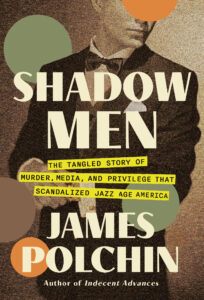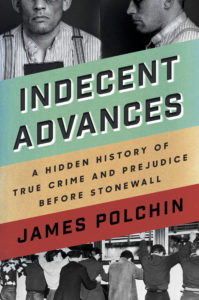James Polchin
JAMES POLCHIN, Ph.D., is a writer, professor, and cultural historian. His book Indecent Advances: A Hidden History of True Crime and Prejudice Before Stonewall was an Edgar Award finalist, Macavity Award Nominee, and named one of the Best True Crime Books of the Year by CrimeReads. His writing has appeared in Slate, TIME, Huffington Post UK, CrimeReads, Paris Review, Rolling Stone, NewNextNow, and the Gay and Lesbian Review Worldwide. He is a Clinical Professor at New York University, and has previously taught at the Princeton Writing Program, the Parsons School of Design, the New School, and the Creative Nonfiction Foundation. He lives in New York with his husband, the photographer Greg Salvatori, and a Labrador named Albert.
Subscribe to our newsletter for news & events from Counterpoint Press.
Books
Shadow Men
The Tangled Story of Murder, Media, and Privilege That Scandalized Jazz Age America
"Polchin knows the era, and brings to his account a wealth of colorful supporting detail . . . With its layers of taboos and public spectacle, the case feels, a century later, as relevant as ever." —Marisa Meltzer, The New York Times Book ReviewFrom Edgar Award finalist James Polchin comes a thrilling examination of the murder that captivated Jazz Age America, with echoes of the decadence and violence of The Great Gatsby
On the morning of May 16, 1922, a young man’s body was found on a desolate road in Westchester County. The victim was penniless ex-sailor Clarence Peters. Walter Ward, the handsome scion of the family that owned the largest chain of bread factories in the country, confessed to the crime as an act of self-defense against a violent gang of “shadow men,” blackmailers who extorted their victims’ moral weaknesses. From the start, one question defined the investigation: What scandalous secret could lead Ward to murder?
For sixteen months, the media fueled a firestorm of speculation. Unscrupulous criminal attorneys, fame-seeking chorus girls, con artists, and misogynistic millionaires harnessed the power of the press to shape public perception. New York governor and future presidential candidate Al Smith and editor of the Daily News Joseph Medill Patterson leveraged the investigation to further professional ambitions. Famous figures like Harry Houdini, Arthur Conan Doyle, and F. Scott Fitzgerald weighed in. As the bereaved working-class Peters family sought to bring the callous Ward to justice, America watched enraptured.
Capturing the extraordinary twists and turns of the case, Shadow Men conjures the excess and contradictions of the Jazz Age and reveals the true-crime origins of the media-led voyeurism that reverberates through contemporary life. It’s a story of privilege and power that lays bare the social inequity that continues to influence our system of justice.
Indecent Advances
A Hidden History of True Crime and Prejudice Before Stonewall
Edgar Award finalist, Best Fact CrimeAmerican Masters (PBS), “1 of 5 Essential Culture Reads”
One of CrimeReads’ “Best True Crime Books of the Year”
“A fast–paced, meticulously researched, thoroughly engaging (and often infuriating) look–see into the systematic criminalization of gay men and widespread condemnation of homosexuality post–World War I.” —Alexis Burling, San Francisco Chronicle
Stories of murder have never been just about killers and victims. Instead, crime stories take the shape of their times and reflect cultural notions and prejudices. In this Edgar Award–finalist for Best Fact Crime, James Polchin recovers and recounts queer stories from the crime pages―often lurid and euphemistic―that reveal the hidden history of violence against gay men. But what was left unsaid in these crime pages provides insight into the figure of the queer man as both criminal and victim, offering readers tales of vice and violence that aligned gender and sexual deviance with tragic, gruesome endings. Victims were often reported as having made “indecent advances,” forcing the accused's hands in self–defense and reducing murder charges to manslaughter.
As noted by Caleb Cain in The New Yorker review of Indecent Advances, “it’s impossible to understand gay life in twentieth–century America without reckoning with the dark stories. Gay men were unable to shake free of them until they figured out how to tell the stories themselves, in a new way.” Indecent Advances is the first book to fully investigate these stories of how queer men navigated a society that criminalized them and displayed little compassion for the violence they endured. Polchin shows, with masterful insight, how this discrimination was ultimately transformed by activists to help shape the burgeoning gay rights movement in the years leading up to Stonewall.

Catapult | Counterpoint | Soft Skull
20 Jay Street #704
Brooklyn, NY 11201
646.926.0805 | contact@catapult.co






